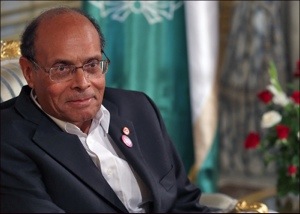Politicians express doubt about a potential UMA summit, while citizens grow weary of the diplomatic wrangling.
By Nazim Fethi in Algiers and Jemal Oumar in Nouakchott for Magharebia
 [AFP/Mark Wilson-Pool] Tunisian President Moncef Marzouki remains optimistic about re-launching the work of the Maghreb Union.
[AFP/Mark Wilson-Pool] Tunisian President Moncef Marzouki remains optimistic about re-launching the work of the Maghreb Union.
A meeting of the Arab Maghreb Union (UMA) slated for this October in Tunisia could be postponed amid lingering differences among member-states.
The union, which includes Mauritania, Morocco, Algeria, Tunisia and Libya, has repeatedly put off a gathering of heads of state since they last met 1994.
Tunisian President Moncef Marzouki, who has toured the region to convince leaders of the need to hold a summit as soon as possible, remains optimistic.
Speaking July 26th, at the height of the controversy over the summit’s postponement, the Tunisian president stood his ground, saying: “The leaders of the Maghreb have all officially confirmed that they will attend the UMA summit scheduled to take place in October, including the president of Algeria, Abdelaziz Bouteflika, and King Mohammed VI of Morocco.”
However, he mentioned that the venue has been changed. Initially scheduled to take place in the border town of Tabarka, it is now due to be held in Tunis.
President Marzouki said that the goal of the summit was “to re-launch the UMA, which has stalled for several years”.
“We must follow the example of the European Union,” Marzouki added.
The Tunisian president’s remarks followed comments by the Moroccan and Algerian governments questioning whether a summit was necessary at the moment.
The first to cast doubt on the usefulness of the summit was Moroccan Prime Minister Abdelillah Benkirane, who announced on July 26th that the time was “not yet right” to hold the summit and that “until the border between Morocco and Algeria has been opened”, such a meeting “will be merely a formality”.
This comment was followed by another one made by Algerian Foreign Ministry spokesman Amar Belani, who said that “the date when the Arab Maghreb Union summit will be held is still subject to consultations and will be decided when the process of preparation is complete”.
He later said that the summit and the closed Algerian-Moroccan border were two “completely separate” issues as far as the Algerian government was concerned. The re-opening of the border “is a purely bilateral matter”, he said, adding that the summit would “be the grand finale of efforts to improve relations between the two countries”.
On the anniversary of King Mohammed VI’s accession to the throne, President Bouteflika reiterated his “steadfast determination to reaffirm the ties of brotherhood and good neighbourliness between Algeria and Morocco”.
The monarch asserted in his own ceremonial speech that the country was “still working to strengthen its bilateral ties with all partners in the Maghreb, including our neighbour Algeria”.
He did not mention the summit, and neither did President Bouteflika in his congratulatory message.
Amid the great optimism of Tunisia and the reservations of Morocco and Algeria, with Libya and Mauritania yet to speak their minds on the matter, it remains doubtful whether the summit will go ahead, at least for the time being.
Mauritania, however, has expressed its desire to develop the union on many occasions, whether through joint Maghreb co-operation or through bilateral co-operation.
In a Throne Day message to King Mohammed VI, Mauritanian President Mohamed Ould Abdel Aziz said that his country was determined to work “with the leadership of Morocco in order to develop the Arab Maghreb Union, as well as to development joint co-operation between Nouakchott and Rabat”.
Related Articles
Experts say the official pronouncements are nothing new.
“Citizens are tired of the speech of diplomacy and have started looking toward what is more important,” commented Mohamed Ould Salek, a specialist in Maghreb affairs.
“Maghreb unity has long existed at the level of the people, but we discover in every political or diplomatic speech that unity does not exist and that there are impediments and obstacles,” said Yacob Ould Saleh, an international relations researcher.
“We do not perceive a difference between Algerian, Moroccan, Libyan, Tunisian and Mauritanian. And the governments, between which there remain sensitivities, must open the borders to goods and to the movement of people, especially Morocco and Algeria, while the rest of the other countries do not suffer from any problem,” Ould Saleh added.






